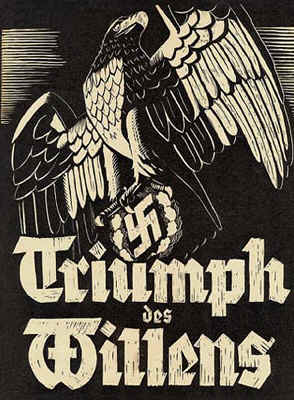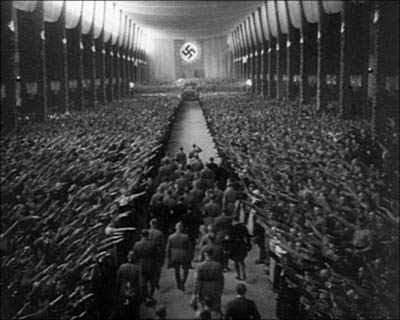 Triumph of Will |
I reached a point during Leni Riefenstahl’s film, where I found myself overpowered by its majesty. I became swept up in its images of cooperation and goodwill between citizens, its hopeful vision of a better future, its themes of modernity, bringing society into a new age of possibility. An ideal is parading before my eyes, beautiful, perfect…
…and then Adolh Hitler appears on the screen and a half-century of infamous history shatters the facade.
Leni Riefenstahl’s camera work was groundbreaking and set standards we take for granted in modern cinema. Her camera is dynamic, rotating around statues to give them dimensions, sweeping across throngs of people, and climbing into the sky to catch the enormity of Nazi gatherings. Her shots are very cognizant of their perspective, shooting the Nazi leadership from a lower vantage point to make them tower above the audience.
Controversy has followed Riefenstahl’s career as a documentary filmmaker. Critical Theorists have debated how much responsibility she holds in her service to the Nazi Party. Riefenstahl claims she was merely filming a documentary. Critics claim her omission of the unsavory aspects of Nazism, editing out Hitler’s statements concerning the Jews, push her into the realm of propaganda filmmaking. The disputation over what constitutes documentary versus propaganda filmmaking continues today, with Michael Moore’s selective presentation of the facts in his films.
“Triumph of Will” also raises controversy for the positive and human face it places on the Nazi movement. Some groups believe the film is still dangerous for its seductiveness. Nazism and Fascism are both movements far more concerned with style over substance, and some fear the film’s hypnotic allure is too much for impressionable minds. Neo-Nazi and White Supremacist groups continue to use the film in the modern day as a recruitment tool.
 Congress Hall Scene from Triumph of Will |
The film’s dangerousness stresses the importance of remembering it, analyzing it, understanding the magic it works on its viewers. Think the Nazis were merely two-dimensional monsters? Watch “Triumph of Will.” How could honorable and virtuous people be swept up into such abhorrent actions? Watch “Triumph of Will.” Think it could never happen here? Watch “Triumph of Will.”
How would “Triumph of Will” be remembered if the Nazi movement had succeeded? Would its inspiring style and vision successfully erase the atrocities wrought to attain it? Would Riefenstahl’s filmmaking talent continue to churn out “feel good” propaganda to persuade the conquered into compliance with the Nazi vision?
If “Never again!” is civilization’s response to history’s chronicle of Nazism’s rise and fall, then “Triumph of Will” should be a part of every standard educational curricula. It raises difficult questions that demand confrontation to challenge our cognitive schemas. We must compare and contrast its effective vision with the historical reality of its subject matter. We must make ourselves aware of its techniques and see how they are still applied to persuade us into the paradigms of those who would control us.